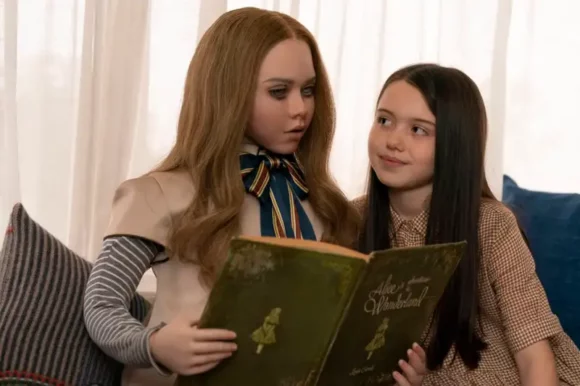Watching M3gan, directed by Gerard Johnstone, for New Scientist, 25 January 2023
Having done something unspeakable to a school bully’s ear, chased him through the forest like a wolf, and driven him under the wheels of a passing car, M3gan, the world’s first “Model 3 Generative Android”, returns to comfort Cady, its inventor’s niece. “We’ve learned a valuable lesson today,” she whispers.
So has the audience, between all their squealing and cheering. Before you ask a learning machine to do something for you, it helps if you know what that thing actually is.
M3gan has been tasked by its inventor Gemma (Allison Williams, in her second Blumfield-produced movie since the company’s 2017 smash Get Out) with looking after her niece Cady (Violet McGraw), recently orphaned when her parents — arguing over who should police her screen time — drove them all under a snow truck.
M3gan is told to protect Cady from physical and emotional harm. What could possibly go wrong with that?
Quite a lot, it turns out. Gemma works for toy company Funki, whose CEO David (comedian Ronny Chieng) is looking for a way — any way — to “kick Hasbro right in the d—.” In a rush to succeed, Gemma ends up creating a care robot that (to paraphrase Terminator) absolutely will not stop caring. M3gan takes very personally indeed the ordinary knocks that life dishes out to a kid.
The robot — a low-budget concoction of masks and CGI, performed by Amie Donald and voiced by Jenna Davis — is an uncanny glory. But the signature quality of Blumfield’s films is not so much their skill with low budgets, as the company’s willingness to invest time and money on scripts. In developing M3gan, James Wan (who directed the 2004 horror film Saw) and Akela Cooper (whose first-draft screenplay was, by her own admission, “way gorier”) discovered in the end that there was more currency in mischief than in mayhem. This is the most sheerly gleeful horror movie since The Lost Boys.
Caring for a child involves more than distracting them. Alas M3gan, evolving from Funki’s “Purrfect Petz” (fuzzballs that quote Wikipedia while evacuating plastic pellets from their bowels) cannot possibly understand this distinction.
The point of parenting is to manage your own failure, leaving behind a child capable of handling the world on their own. M3gan, on the contrary, has absolutely no intention of letting Cady grow up. As far as M3gan is concerned, experience is the enemy.
In this war against the world M3gan transforms, naturally enough, into a hyperarticulated killing machine (and the audience cheers: this is a film built on anticipation, not surprise).
M3gan’s charge, poor orphaned Cady, is a far more frightening creation: a bundle of hurt and horror afforded no real guidance, adrift without explanations in a world where (let’s face it) everything will eventually die and everything will eventually go wrong. The sight of a screaming nine-year-old Cady slapping her well-intentioned but workaholic aunt across the face is infinitely more disturbing than any scene involving M3gan.
“Robotic companionship may seem a sweet deal,” wrote the social scientist Sherry Turkle back in 2011, “but it consigns us to a closed world — the loveable as safe and made to measure.”
Cady, born into a world of fatuous care robots, eventually learns that the only way to get through life is to grow up.
But the real lesson here is for parents. The robot exists to do what we can imagine doing, but would rather not do. And that’s fine, except that it assumes that we always know what’s in our own best interests.
I remember in 2014, at a conference on human-machine interaction, I watched a a video starring Nao, a charming “educational robot”. It took a while before someone in the audience (not me, to my shame) spotted the film’s obvious flaw: how come it shows a mother sweating away in the kitchen while a robot is enjoying quality time with her child?

